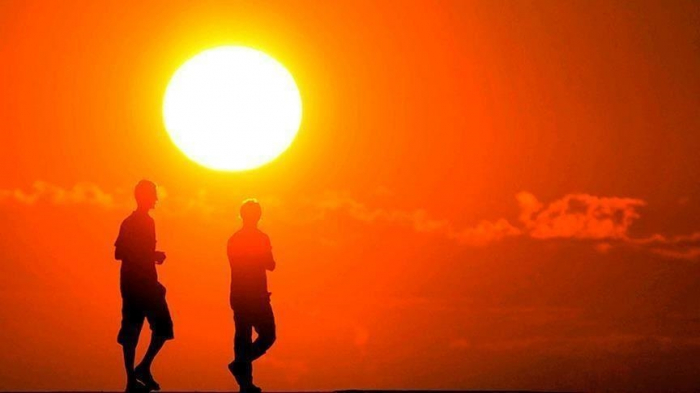The COP28 climate change conference called on all countries to move from fossil fuels in the global fight against climate change. The high-level climate summit was held amid extreme weather events linked to the climate crisis.
The world witnessed the hottest summer on record, with the global average temperature reaching 16.77C (62.19F) from June to August. The hottest day in history was recorded on July 6, soaring to 17.23C.
Rising temperatures linked to global warming spark deadly extreme weather events, with more than 11,000 lives lost in Libya’s recent flood disaster
Israeli attacks on Gaza, causing civilian casualties, also unleashed an environmental and public health crisis with the use of banned munitions like white phosphorus.
Anadolu covers key global environmental developments in 2023.
El Nino adds to global warming effect
The El Nino weather phenomenon took effect in May, leading to record temperatures worldwide. Between June and August, the global average temperature soared to 16.77C, surpassing the long-term average by 0.66C, marking the hottest summer in history.
The hottest day was recorded on July 6, with a global average temperature of 17.23C.
Following the hottest summer, temperatures remained unusually high in the fall.
The average temperature in September was recorded at 16.38C, surpassing the 1991-2020 average by 0.93C, marking the hottest September in history, according to EU Copernicus Climate Change Service data.
The hottest October set at a record with an average temperature of 15.3C, and November became the warmest in history with an average of 14.22C.
The World Meteorological Organization’s “2023 Global Climate Status” report declared 2023 the hottest year.
UN Secretary-General Antonio Guterres declared the end of the era of global warming, stating that instead a “global boiling era” has begun.
Guterres urgently called on the world to take immediate measures to limit temperature increases and avoid the consequences of climate change.
Flood in Libya
Rising temperatures linked to climate change have brought about extreme weather events and disasters.
The Daniel storm, which hit eastern Libya on Sept. 10, wreaked havoc in Derna, Bayda, Benghazi, Merg, Tacnis, Sousse, Mehili and Verdiyye, causing a devastating flood.
The flood resulted in the loss of over 11,000 lives and caused more than $2 billion in property damage in affected areas of the central Mediterranean.
Forest fires
Thousands of residents in Canada’s Alberta province were evacuated due to forest fires erupting in 78 locations. The smoke from the fires spread to US states, causing a decline in air quality and triggering red alerts.
Throughout the summer, 6,132 fires occurred at various scales, affecting 16.5 million hectares (40.8 million acres) of land.
Greece faced its worst forest fire disaster since 2000 in July, with over 20 lives lost. More than 100,000 people, including 30,000 children, were affected nationwide, and at least 155,000 hectares of land were destroyed.
The fires, notably devastating on Rhodes Island, continued into late summer.
Another Mediterranean country, Italy, battled wildfires throughout the year. The fires, erupting in various locations and lasting until September, burned 51,386 hectares of forested area. The most severely affected region was the island of Sicily.
Record-breaking sea surface temperatures
In 2023, record-breaking sea surface temperatures were observed on land and in the oceans.
According to the UK Met Office, the sea surface temperature increased in May to 1.25C (34.35F) compared to the 1961 - 1990 reference period.
Monthly sea surface temperatures recorded in April and May were the highest since 1850.
In May, the North Atlantic saw a record temperature increase, influenced by El Nino.
COP28
The 28th Conference of the Parties (COP28) to the UN Framework Convention on Climate was held in Dubai, United Arab Emirates, from Nov. 30 to Dec. 12.
Over 70,000 delegates from around the world attended the climate change conference, which concluded after two weeks with the acceptance of the final text calling on all countries to phase out fossil fuels.
Bonn Climate Change Conference
The 58th Bonn Climate Change Conference, held from June 5 to 15, focused on financial aspects related to climate crisis-induced losses, damages and adaptation processes, with experts and government officials in attendance.
IPCC's sixth assessment report
The Synthesis Report of the 6th Assessment prepared by scientists of the Intergovernmental Panel on Climate Change (IPCC), a body under the UN, has been approved.
The report focuses on the increasing risks of losses and damages caused by the climate crisis, emphasizing that 3.6 billion people live in highly vulnerable areas.
World Environment Day
On June 5, World Environment Day was celebrated with the theme “Beat Plastic Pollution.”
Before events, the UN Environment Programme (UNEP) published a report setting a goal to reduce plastic pollution by 80% by 2040, emphasizing the need to reduce unnecessary plastic production.
Israeli attacks in Gaza led to significant loss of life, environmental catastrophe
Israel’s Oct. 7 attacks in Gaza resulted in the loss of thousands of civilian lives, causing extensive damage to the region and triggering an environmental and public health catastrophe.
The use of prohibited white phosphorus bombs is expected to have a long-lasting effect. Gaza’s longstanding water crisis, exacerbated by Israel’s interventions, was again brought to the forefront.
Drought hits Panama Canal
A drought in the Panama Canal, connecting the Atlantic and Pacific oceans, has led to restrictions on transits. Over 200 ships were stranded due to limitations imposed during the canal’s driest period.
Japan discharged radioactive wastewater into the ocean
Japan started discharging radioactive wastewater from the damaged Fukushima Daiichi Nuclear Power Plant into the ocean on Aug. 24, 2011, following the 2011 earthquake and tsunami.
Despite global protests, the Japanese government continued the discharge in October and November.
Chemical-carrying truck overturned in US
On Feb. 3, a train with 150 cars carrying chemical substances derailed near East Palestine, Ohio, causing an environmental disaster.
Following the incident, residents in the vicinity reported symptoms such as headaches, eye irritation, coughing, and fatigue and observed animal deaths.
More about:
















































